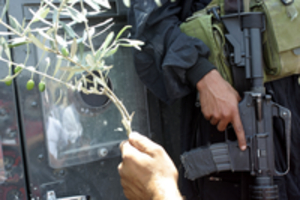In the run-up to the Fourth High Level Forum in Busan, Palestinian civil society organizations are speaking out on the much needed reform of international aid.
 In the run-up to the Fourth High Level Forum in Busan, Palestinian civil society organizations are speaking out on the much needed reform of international aid. Dalia Association and other Palestinian NGOs have joined the global movement for aid reform by launching a campaign to enable Palestinians to claim their rights to self-determination in development. Palestinians’ rights to self-determination are already denied by occupation, colonization and dispossession. International aid, which is supposed to help, should not be delivered in ways that further undermine local priorities, capacities, ownership and rights.
In the run-up to the Fourth High Level Forum in Busan, Palestinian civil society organizations are speaking out on the much needed reform of international aid. Dalia Association and other Palestinian NGOs have joined the global movement for aid reform by launching a campaign to enable Palestinians to claim their rights to self-determination in development. Palestinians’ rights to self-determination are already denied by occupation, colonization and dispossession. International aid, which is supposed to help, should not be delivered in ways that further undermine local priorities, capacities, ownership and rights.
I volunteer for Dalia Association, a Palestinian community foundation, and together with my colleagues I strongly believe that the aid-dependence as known In Palestine undermines self-reliance, philanthropy and local decision-making, which are core objectives of community foundations. Dalia Association has now for the first time started a campaign to seek support for this vision around the world.
Our acting executive director, Saeeda Mousa, recently said that: “The campaign aims to raise awareness among Palestinians and internationals that we do have rights in the aid process and that respect for these rights is tied to development effectiveness. We also want to cultivate tangible support for aid reform among southern civil society organizations and northern allies. This is the first step in a longer process of engaging constructively with donors and international NGOs to change the policies and practices that perpetuate aid dependence and disempower local civil society.”
Our advocacy campaign began with the launch of Dalia Association’s research with community-based organizations entitled, Appeal by Palestinian Civil Society to the International Community to Respect Our Right to Self-Determination in the Aid System. The report expresses the complaints and recommendations of grassroots civil society in Palestine and gives rare and valuable insight into how recipients experience the aid system. Participants for instance stated that:
- Most donors fund relief, not development;
- Use of intermediaries can harm local civil society’s effectiveness and sustainability;
- International aid organizations often impose unrealistic and unfair procedures;
- Many international aid organizations impose agendas rather than respond to local ones;
- Proposals and reports usually cannot be in Arabic, which is the local language;
- Most donors fund using political criteria;
- There is insufficient local leadership in agenda-setting and decision-making; and
- Anti-terrorism clauses are unacceptable
The workshop participants also made recommendations about how to improve the international aid system. These included:
- Select and evaluate civil society grantees fairly and transparently;
- Fulfill commitments;
- Respect local priorities and capacities;
- Follow up…genuinely;
- Don’t fund through unprofessional intermediaries;
- Give aid on professional, not political, criteria;
- Enable sustainability through longer and more flexible funding; and
- Invest in local capacity, not in INGOs at Palestinians’ expense.
Changes like these will not only directly improve aid programs, but leverage local insight and capacity, thus providing donors with greater value for their contributions.
The campaign is timed to correspond with the Fourth High Level Forum on Aid Effectiveness in Busan, Korea at the end of November. Participating in the High Level Forum is a huge honor and responsibility for us. Dalia Association is the only Palestinian NGO participating and only one of eight civil society representatives from the Arab world.
Although Palestine’s political context is unique, the challenges it faces as a result of aid dependence are similar to the challenges faced in other aid-dependent regions. For this reason, both the problems – and the solutions – uncovered by the campaign in Palestine should be of interest across the globe. We therefore encourage our international allies to read and disseminate the report and sign the petition. We also invite civil societies in other aid-dependent regions to contact us with ideas about how we can cooperate in this effort.
